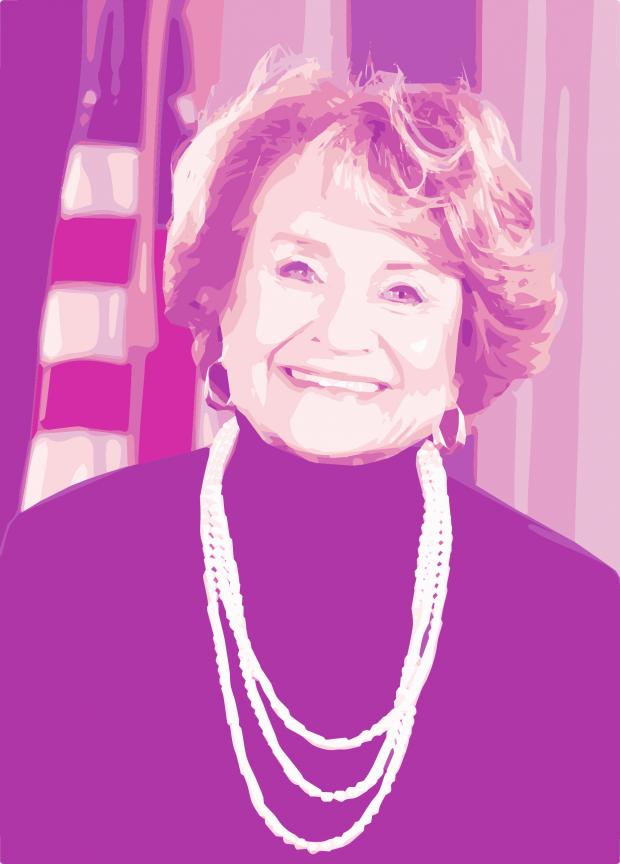Louise Slaughter Was a Champion of the People
Primary tabs
Like so many of my fellow Rochesterians, I will remember Louise Slaughter for her commitment to the underdogs, outcasts, disadvantaged, victims and survivors. When so many of her colleagues were casting votes to get rich, gain power, or hide from their mistakes, Slaughter used the best information available to speak on behalf of the voiceless in society. Her votes were for the immigrants, minorities, children, elderly, ill and wounded. When others in politics were looking to use their power for themselves, Slaughter used it to help women, veterans, and the environment. Whether she was taking on the banks for corruption, or standing up for farmers over subsidies, she always cared about the welfare of people first.
I had the good fortune to see her work up close. In 2000, as part of a St. John Fisher College sponsored program, I enlisted as a service learning volunteer at the Rochester Democratic Headquarters on East Ave. Folding envelops, making calls, surveying neighborhoods, and spreading the word about Slaughter’s campaign, I got a chance to see her operate in the heat of battle. I admired the way she talked to employees, volunteers, the media, and her constituents. As a candidate, she was always extremely attentive, courteous, and energetic.
In 2006 I graduated from Colgate Rochester Crozer Divinity School. The commencement speaker that year was Representative Slaughter. While enraptured by her heartfelt speech, I remember thinking to myself how she had a dozen or more things that she could have been doing that would be more important than this. Instead of taking some high profile meeting in Washington, traveling to a foreign country on a diplomacy mission, or courting wealthy donors, she was in a small church, speaking truth to power to a modest gathering of future ministers and social workers. I will never forget her passionate words of encouragement that day.
Another story feels precious right now. My wife told me about seeing Slaughter during her 8th grade class field trip to D.C. Her teacher recognized the Congresswoman going up some stairs in the Capital, went over and asked if she would say a few words to the kids. Naturally she said yes.
That was Louise Slaughter. She said yes for the right reasons and to the right people.
But Slaughter also knew how to say no when she needed to. Perhaps her most difficult vote in Congress came in October 2002, when she and her peers were called to go to war in Iraq. Under immense political and social pressure, Slaughter was one of the few leaders in the DNC who had the prophetic courage to resist the Bush agenda. Her “No” vote demanded exceptional fortitude. In 2011, she again acted with fortitude when she voted yes on removing U.S. armed forces from Afghanistan.
As opposed to these ill advised wars as she was, Slaughter never stopped fighting to make sure that soldiers had the weapons and armor they needed to stay safe and be effective. She also fought to make sure that our veterans had the healthcare they deserved when the fighting was done. More than any other member of the House, it was Slaughter who hounded the Bush administration to find out how much money was being spent on the wars. She never stopped asking the hard questions.
Now that I am in my late thirties, I find that the legacy of Louise Slaughter is a cornerstone of my academic and professional life. The counseling work that I am currently engaged with at the Willow Domestic Violence Center in Rochester, is more influenced by Slaughter’s legacy than I ever realized. An agency of this size and scope would never exist the way it does without Slaughter’s landmark passage of the Violence Against Women Act in 1994. This bill radically changed the way government deals with the epidemic of domestic violence. One of the least ideological members of the U.S. House, Slaughter was able to tell the remarkable stories of domestic violence survivors and champion their struggle in a public way. Like she had done for countless other groups in her political career, she was able to make the plight of women in domestic violence situations a public health crisis and national emergency. Due to her tenacious activism, thousands of lives have been saved.
Louise Slaughter was a towering figure in American government. She was the first woman to Chair the House Rules Committee, a degree earning microbiologist, a defender of the working class, a patriot in every sense of the word, and a representative of the people who will never be replaced.










